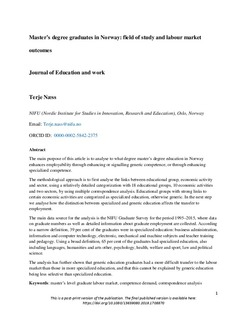Master's degree graduates in Norway: field of study and labour market outcomes
Journal article, Peer reviewed
Accepted version

View/
Date
2020Metadata
Show full item recordCollections
Original version
Næss, T. (2020). Master's degree graduates in Norway: field of study and labour market outcomes. Journal of Education and Work, 33(1), 1-18. 10.1080/13639080.2019.1708870Abstract
The main purpose of this article is to analyse to what degree master’s degree education in Norway enhances employability through enhancing or signalling generic competence, or through enhancing specialised competence. Using multiple correspondence analysison the links between educational group, economic activity and sector, educational groups with strong links to certain economic activities were categorised as specialised education, otherwise generic. In the next step, we analyse how the distinction between specialised and generic education affects the transfer to employment. The main data source for the analysis is the NIFU Graduate Survey for the period 1995–2015, where data on graduate numbers as well as detailed information about graduate employment are collected. According to a narrow definition, business administration, information and computer technology, electronic, mechanical and machine subjects and teacher training and pedagogy were specialized education. Using a broad definition, this also includied languages, humanities and arts other, psychology, health, welfare and sport, law and political science. The analysis found that generic education graduates had a more difficult transfer to the labour market than specialised education graduates and that this cannot be explained by generic education being less selective than specialised education.